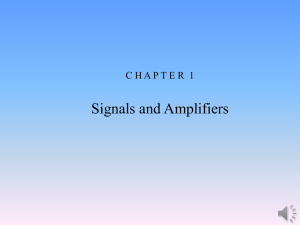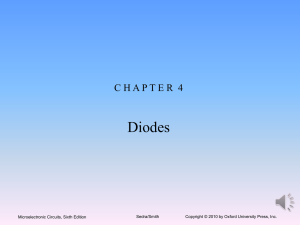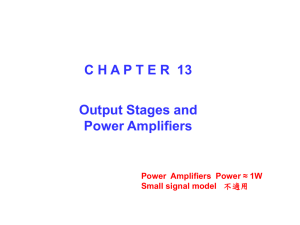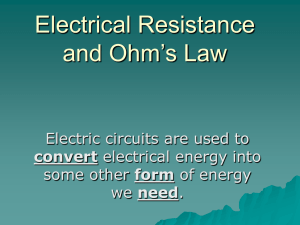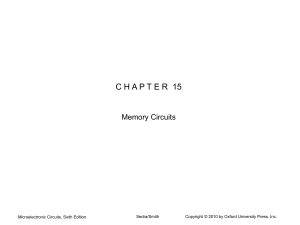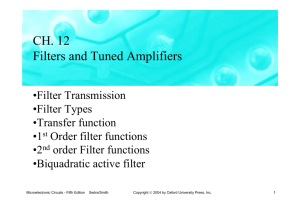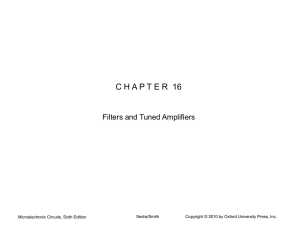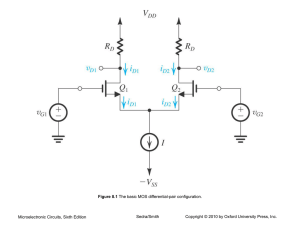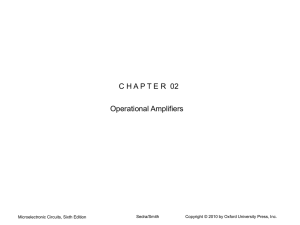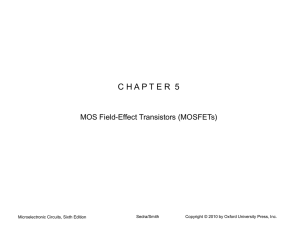Constant Voltage Drop Model Piecewise Linear Model
advertisement
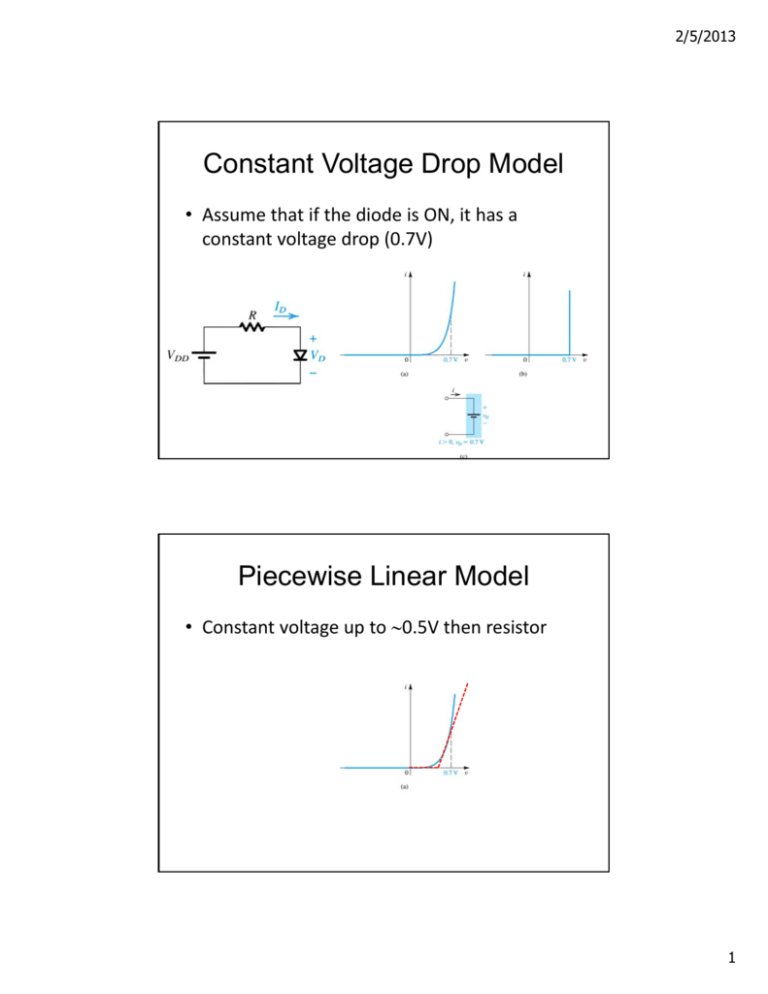
2/5/2013 Constant Voltage Drop Model • Assume that if the diode is ON, it has a constant voltage drop (0.7V) Piecewise Linear Model • Constant voltage up to 0.5V then resistor 1 2/5/2013 Ideal Diode Model • Similar to constant voltage drop, but the voltage drop is 0 V Find ID and VD for VDD = 5V, R=10K Assume 0.7 V at 1-mA Use iteration 2 2/5/2013 Design a circuit to provide output voltage of 2.4V (0.7 V at 1 mA) Figure E4.11 Microelectronic Circuits, Sixth Edition Sedra/Smith Copyright © 2010 by Oxford University Press, Inc. Small Signal Model Figure 4.13 Development of the diode small-signal model. Microelectronic Circuits, Sixth Edition Sedra/Smith Copyright © 2010 by Oxford University Press, Inc. 3 2/5/2013 Solve Figure 4.14 (a) Circuit for Example 4.5. (b) Circuit for calculating the dc operating point. (c) Small-signal equivalent circuit. Microelectronic Circuits, Sixth Edition Sedra/Smith Copyright © 2010 by Oxford University Press, Inc. Voltage Regulator (forward bias) • A voltage regulator is a circuit that provides a constant DC voltage even with the changes of the load resistance or the source resistance. • Since the diode in the forward bias region have a constant voltage with relatively large changes in current, it could be used as a voltage regulator 4 2/5/2013 Solve Figure 4.15 Circuit for Example 4.6. Microelectronic Circuits, Sixth Edition Sedra/Smith Copyright © 2010 by Oxford University Press, Inc. Solve Figure E4.15 Microelectronic Circuits, Sixth Edition Sedra/Smith Copyright © 2010 by Oxford University Press, Inc. 5 2/5/2013 Zener Diode • Diodes that are designed to operate in the reverse breakdown region. • Used for low current regulators (although regulators chips are widely used now). Zener diodes • Characterized by – Vz at a specified test current IZT – Maximum power – Knee current IKZ – Incremental (dynamic) resistance rz=V/I Microelectronic Circuits, Sixth Edition Sedra/Smith Copyright © 2010 by Oxford University Press, Inc. 6 2/5/2013 Zener Diodes • Equivalent circuit • VZ0 in practice is the same as the knee voltage Microelectronic Circuits, Sixth Edition Sedra/Smith Copyright © 2010 by Oxford University Press, Inc. Assume a 6.8-V Zener diode with VZ=6.8 at Iz=5mA, rz=20 , IZK = 0.2 mA, V+ =10V 1V • Find VO and the line regulation at no load • Find the load regulation when the load current is 1mA • Find VO for R=2 K, 0.5K • Find the minimum load for the diode to operate in the breakdown region Microelectronic Circuits, Sixth Edition Sedra/Smith Copyright © 2010 by Oxford University Press, Inc. 7 2/5/2013 Changing amplitude and Electrical isolation ripples Figure 4.20 Block diagram of a dc power supply. Microelectronic Circuits, Sixth Edition Sedra/Smith Copyright © 2010 by Oxford University Press, Inc. Half-Wave Rectifier • Removes the negative voltage half cycle • Peak inverse voltage < breakdown voltage Microelectronic Circuits, Sixth Edition Sedra/Smith Copyright © 2010 by Oxford University Press, Inc. 8 2/5/2013 Full‐Wave Rectifier Microelectronic Circuits, Sixth Edition Sedra/Smith Copyright © 2010 by Oxford University Press, Inc. PIV ? 9 2/5/2013 Bridge Rectifier PIV ? Figure 4.23 The bridge rectifier: (a) circuit; (b) input and output waveforms. Microelectronic Circuits, Sixth Edition Sedra/Smith Copyright © 2010 by Oxford University Press, Inc. Figure 4.24 (a) A simple circuit used to illustrate the effect of a filter capacitor. (b) Input and output waveforms assuming an ideal diode. Note that the circuit provides a dc voltage equal to the peak of the input sine wave. The circuit is therefore known as a peak rectifier or a peak detector. Microelectronic Circuits, Sixth Edition Sedra/Smith Copyright © 2010 by Oxford University Press, Inc. 10 2/5/2013 Microelectronic Circuits, Sixth Edition Sedra/Smith Copyright © 2010 by Oxford University Press, Inc. Figure 4.26 Waveforms in the full-wave peak rectifier. Microelectronic Circuits, Sixth Edition Sedra/Smith Copyright © 2010 by Oxford University Press, Inc. 11 2/5/2013 Superdiode • There is one or 2 diode voltage drops in the rectifier circuits we studied. • That is O.K. when we are designing a DC power supply. • Can not be used to rectify a small voltage signal (100 mV). Superdiode • When vI is positive, vA is positive, the diode conducts providing the –ve feed back and vO=vI • When vI is –ve vA is negative diode is reverse biased, no current in R no drop on R, v0=0 Microelectronic Circuits, Sixth Edition Sedra/Smith Copyright © 2010 by Oxford University Press, Inc. 12 2/5/2013 Diode Circuits • Limiter circuits • Clamped capacitor or DC restorer • Voltage doubler Limiter Circuits • K could be > 1, but we concentrate of k<=1 (passive limiter) • Also known as clippers • Soft limiting vs. hard limiting Microelectronic Circuits, Sixth Edition Sedra/Smith Copyright © 2010 by Oxford University Press, Inc. 13 2/5/2013 Figure 4.31 A variety of basic limiting circuits. Microelectronic Circuits, Sixth Edition Sedra/Smith Copyright © 2010 by Oxford University Press, Inc. Figure E4.26 Microelectronic Circuits, Sixth Edition Sedra/Smith Copyright © 2010 by Oxford University Press, Inc. 14 2/5/2013 Clamped Capacitor (DC restorer) • Shifts the input signal by a specific amount • When vI is ‐6, vC = 6 V as shown • When vI is +4, diode is off and capacitor does not discharge • vO = vI + vC Microelectronic Circuits, Sixth Edition Sedra/Smith Copyright © 2010 by Oxford University Press, Inc. Clamped Capacitor with a Load Figure 4.33 The clamped capacitor with a load resistance R. Microelectronic Circuits, Sixth Edition Sedra/Smith Copyright © 2010 by Oxford University Press, Inc. 15 2/5/2013 Voltage Doubler Figure 4.34 Voltage doubler: (a) circuit; (b) waveform of the voltage across D1. Microelectronic Circuits, Sixth Edition Sedra/Smith Copyright © 2010 by Oxford University Press, Inc. Figure P4.2 Microelectronic Circuits, Sixth Edition Sedra/Smith Copyright © 2010 by Oxford University Press, Inc. 16 2/5/2013 Figure P4.3 Microelectronic Circuits, Sixth Edition Sedra/Smith Copyright © 2010 by Oxford University Press, Inc. Figure P4.4 Microelectronic Circuits, Sixth Edition Sedra/Smith Copyright © 2010 by Oxford University Press, Inc. 17 2/5/2013 Figure P4.5 Microelectronic Circuits, Sixth Edition Sedra/Smith Copyright © 2010 by Oxford University Press, Inc. Figure P4.6 Microelectronic Circuits, Sixth Edition Sedra/Smith Copyright © 2010 by Oxford University Press, Inc. 18 2/5/2013 Figure P4.9 Microelectronic Circuits, Sixth Edition Sedra/Smith Copyright © 2010 by Oxford University Press, Inc. 19
